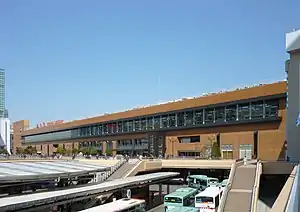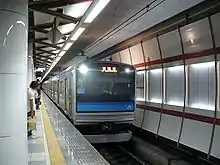Sendai Station (Miyagi)
Sendai Station (仙台駅, Sendai-eki) is a major junction railway station in Aoba-ku, Sendai, Miyagi, Japan. It is a stop for all Akita and Tohoku Shinkansen trains, the eastern terminus for the Senzan Line, and major stop on both the Tohoku Main Line and Senseki Line. It is located on the border between Miyagino and Aoba Wards in Sendai, Miyagi Prefecture.
N10 T07 Sendai Station 仙台駅 | |
|---|---|
 The west side of Sendai Station in April 2017 | |
| Location | 1 Chuo, Aoba-ku, Sendai-shi, Miyagi-ken Japan |
| Operated by | |
| Line(s) |
|
| Connections | Bus terminal |
| Other information | |
| Status | Staffed |
| Station code | N10 (Namboku Line) T07 (Tozai Line) |
| History | |
| Opened | 15 December 1887 |
| Passengers | |
| FY2018 | 91,278 daily (JR East) 55,614 daily (Sendai Subway) |
| Services | |
| Location | |
 Sendai station Location within Miyagi Prefecture  Sendai station Sendai station (Japan) | |
Lines
Sendai Station is served by services operated by East Japan Railway Company (JR East), Sendai Airport Transit, and Sendai Subway. The station is served by the following lines.
JR East
- Tohoku Shinkansen
- Akita Shinkansen
- Tohoku Main Line
- Senzan Line
- Senseki Line
- Joban Line
Sendai Airport Transit
Sendai Subway
Station layout

JR East
Although the main JR train station and the subway station are physically separate, there are underground passageways connecting the two. The main Sendai Station is above-ground, and is a hub for JR East containing both the Tohoku and Akita Shinkansen lines and several other local lines. The above-ground portion of Sendai Station lies in Aoba-ku, and is situated so that tracks run roughly north-south. In the station's easternmost section, underground and across the ward border in Miyagino-ku, is the platform for the east-west Senseki Line. Originally, this platform was also above ground; but in 2000, the line was extended to Aoba-dōri to the west, and the line was re-routed underground beneath the rest of the station.
Sendai Subway
The Sendai Subway lies to the west, and can be accessed from the main station via underground passageways at both ends of the station. The platform for the subway at Sendai Station is actually closer to Aoba-dōri Station than the other JR lines in Sendai Station. In fact, there is a transfer-only gate between the subway and Senseki Line platform at Aoba-dōri Station.
.jpg.webp) Tozai line ticket hall
Tozai line ticket hall.jpg.webp) Tozai line station sign
Tozai line station sign Tozai line platform
Tozai line platform Namboku line ticket hall
Namboku line ticket hall South ticket hall
South ticket hall Namboku line platform
Namboku line platform.jpg.webp) Namboku line platform
Namboku line platform Namboku line train
Namboku line train
Platforms
The Namboku Line platforms are located on the third basement ("B3F") level, and the Tozai Line platforms are located on the fourth basement ("B4F") level.
| 1 | ■ Namboku Line | ■ for Tomizawa |
| 2 | ■ Namboku Line | ■ for Izumi-Chūō |
| 3 | ■ Tozai Line | ■ for Arai |
| 4 | ■ Tozai Line | ■ for Yagiyama Zoological Park |
Passenger statistics
In fiscal 2018, the JR East station was used by an average of 91,278 passengers daily (boarding passengers only), making it the busiest JR East station outside of the Greater Tokyo Area. It is also the busiest JR East station in Miyagi Prefecture and the 50th-busiest on the JR East network as a whole.[2] In fiscal 2018, the Sendai Subway portion of the station was used by an average of 55,614 passengers daily.[3]
The JR East passenger figures (boarding passengers only) for previous years are as shown below.
| Fiscal year | Daily average |
|---|---|
| 1913 | 1,628[4] |
| 1960 | 43,089[4] |
| 1971 | 58,799[4] |
| 1984 | 64,634[4] |
| 2000 | 78,195[5] |
| 2005 | 76,723[6] |
| 2010 | 74,672[7] |
| 2015 | 84,964[8] |
Surrounding area
West (main) exit

The area outside the west exit of Sendai Station is the traditional center of activity around the station. This is because the area is closer to the central business district of Sendai, which initially developed around Sendai Castle.
The area is home to some of the largest department stores in Sendai. The S-Pal department store and the Station are directly connected to each other. A large elevated walkway outside the exit provides access to other department stores, such as the Loft Department Store, Sakurano Department Store, the Jujiya Co. Sendai Store, and EBeanS. EbeanS is home to Junkudo Sendai, the largest bookstore in the Tohoku Region. The AER Building, a large office building built through recent redevelopment, is also located in the area and is home to various offices and stores, such as Maruzen, another large bookstore.
The area around the Asaichi-dori street, next to EBeanS, is known as the Sendai Asaichi (Sendai morning Market), although stores are open all day long. The Asaichi is home to a wide variety of small stores that mainly sell Japanese foods.
The Sendai Metropolitan Hotel can be directly accessed via the elevated walkway and is extremely convenient for visitors unfamiliar with the area. The entrance to Sendai's largest shopping malls, such as the Clis Road Shopping District and the Ichibancho Shopping District, are located close to the exit of the elevated walkway, and a bus exchange area and taxi pool can be found under the walkway.
East exit
The area outside the east exit of Sendai Station is the "new" side of the station. It traditionally had a smaller concentration of businesses compared to the west side. That the area was not damaged by World War II bombing also delayed development in the area.
The municipal government decided to conduct redevelopment in the area in 1960. The redevelopment project is still in progress, but the area has already been largely renovated with a new bus exchange area and taxi pool. The Yodobashi Camera Sendai Store, one of the largest electronics retailers in Sendai, is located right outside of the east exit and BiVi Sendai, a department store, is located close by. The east side of the station is close to many entertainment venues, such as Beeb Sendai and Sendai Sunplaza. Miyagi Baseball Stadium is within walking distance.
References
- Sendai Station information. East Japan Railway Company. Retrieved on 13 August 2008. (in Japanese)
- 各駅の乗車人員 (2018年度) [Station passenger figures (Fiscal 2018)] (in Japanese). Japan: East Japan Railway Company. 2019. Retrieved 11 May 2020.
- 仙台市地下鉄 駅別乗車人員の推移 [Sendai city underground station passenger statistics] (PDF) (in Japanese). Japan: Sendai city. 2018. Retrieved 31 May 2020.
- 日本国有鉄道停車場一覧 [JNR Station Directory]. Japan: Japanese National Railways. 1985. p. 480. ISBN 4-533-00503-9.
- 各駅の乗車人員 (2000年度) [Station passenger figures (Fiscal 2000)] (in Japanese). Japan: East Japan Railway Company. Retrieved 30 December 2012.
- 各駅の乗車人員 (2005年度) [Station passenger figures (Fiscal 2005)] (in Japanese). Japan: East Japan Railway Company. Retrieved 30 December 2012.
- 各駅の乗車人員 (2010年度) [Station passenger figures (Fiscal 2010)] (in Japanese). Japan: East Japan Railway Company. Retrieved 30 December 2012.
- 各駅の乗車人員 (2015年度) [Station passenger figures (Fiscal 2015)] (in Japanese). Japan: East Japan Railway Company. Retrieved 12 May 2020.
External links
![]() Media related to Sendai Station (Miyagi) at Wikimedia Commons
Media related to Sendai Station (Miyagi) at Wikimedia Commons
- Official website (in Japanese)
- Official website (Sendai Subway) (in Japanese)
